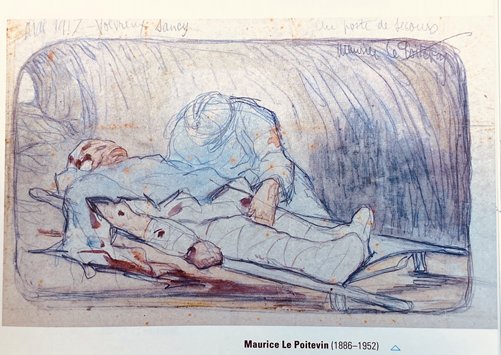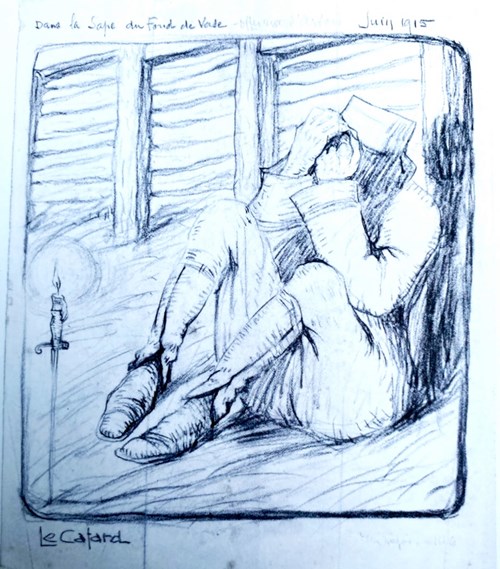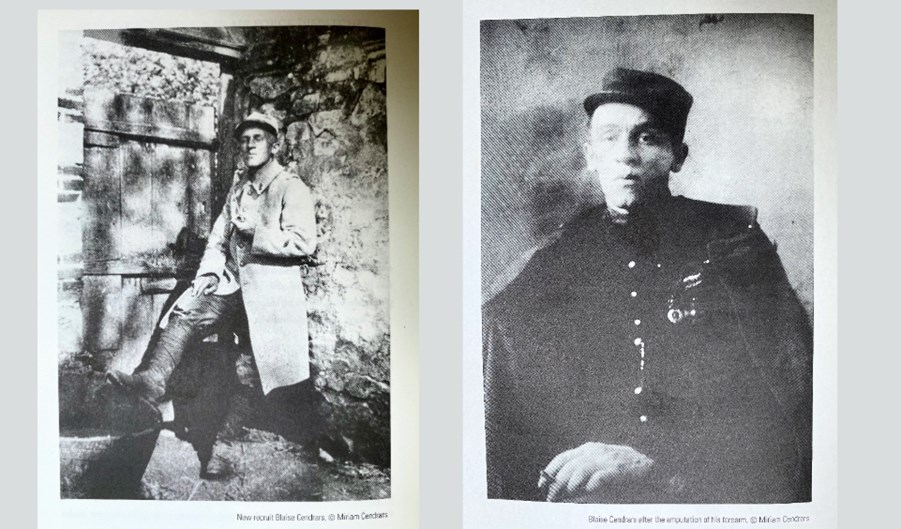The Bloody Hand by Blaise Cendrars
- Home
- World War I Book Reviews
- The Bloody Hand by Blaise Cendrars

Éditions Vagamundo 2015. Published with the support of Brittany Council.
First published 1946 under the title La Main coupée Éditions Denoël).
Original text copyright (c) Miriam Cendrars.
This edition translated by Graham macLachlan.
Design by Laurent Brunet.
ISBN 979-10-92521-01-6
Printed in a run of 2,000 copies by Cloître Imprimeurs, France.
The introduction by renowned French historian Nicolas Beaupré was commissioned especially for this new and unabridged translation of The Bloody Hand. This places The Bloody Hand in its historical context and takes a comprehensive look at its themes. Written in the 1930s, long after interest in the Great War had waned, Blaise Cendrars could well have been inspired by the style of Henry Miller, whose Tropic of Cancer had recently been published and that Blaise Cendrars admired for its forthright and fluid style. Cendrars had put off writing an account of his war experience for over 15 years and had initially envisaged writing five volumes.
The final section of this edition contains a three thousand word biography of Blaise Cendrars including a complete list of his published works.
A wonderful edition at the end of the book is an album of fifty illustrations selected by Pascal Moreul depicting life in the trenches of the Great War. Many of these works have never been published before and all the artists saw service on the Western Front, such as these by Maurice Le Poitevin.


Considerable thought has been given to the design, the layout of the text on the page, and the excellent selection of art, drawings, and coloured pictures from the trenches.
As you read, you may be reminded of Erich Henri Remarque's 'All Quiet on the Western Front', 'Goodbye to All That' by Robert Graves or even Norman Mailer's first book based on his memoir as a soldier 'The Naked and the Dead'. Each, like Cendrar's 'La Main coupée' is an extraordinarily candid evocation of the what it was like to live through the war, its people and funny, fearful and sad human moments.
Blaise Cendrars

Blaise Cendrars was born in Switzerland and is French-speaking. As a young man, he went to Moscow, where he fell in love. He then moved to Paris. For those who had the means, movement around Europe had few barriers.
With the outbreak of war in 1914, Cendrars joined the French Foreign Legion because of his love of France. In an open letter co-written by fellow authors like himself, others were encouraged to do the same.
The Bloody Hand has class
The Bloody Hand is a terrific piece of literature. This wonderful translation encourages me to try the original French edition.
The Bloody Hand is a series of well-told stories of an odd bunch of characters skilfully portrayed who placed themselves in the extraordinary circumstances of war. As volunteers and French Legionnaires, they behave as if the condition of war is the usual one, carrying on as if bullets are just like flying rain and bombs blow in like the wind to irritate their daily activities. They purloin food, find drink and woman, or simply steal from the German trenches as if it were a typical nightly activity to stave off the boredom of being placed in a 'quiet' section of the line towards the far southern end of the Western Front.
You will laugh out loud
These stories' spontaneity and stream of consciousness read like Henry Miller (without the smut). They are indulgences mixed with insightful reflections and great lines you want to learn and quote.
The characters are memorable; their behaviour often leaves a smile on the face: you will laugh out loud.
This is war. And many of them die. The author has his right arm so damaged that it is amputated.
For these men, 'war' was a job. Like a bunch of scallywags, they are forever finding ways to improve their circumstances through a series of events that see them steal a punt and cross into German lines through a labyrinth of broken waterways, stealing, inadvertently, German plans for an attack that brings the author unwanted attention from his senior officers. Being who he is, Cendrars turns down promotion and any honours. He likes living 'below the radar' as it were.
The translation from French into English is seamless
You are left with the impression that 'The Bloody Hand' was for Graham MacLachlan, its new translator from the French into English, a labour of love. It uses the skills of someone who knows the French language intimately and their role as a translator to transform a piece of nuanced French Literature into an equally memorable piece of English literature.
The Bloody Hand is a memoir, written long after the events they describe.
Every chapter, a character or a tale, told as if from a bar stool or around a cafe dinner table long after the meal is over, creates a memory. Many are laugh-out-loud funny, others are curious, and others make you stop, think and take notes.
As the author himself states, 'The Bloody Hand' is not a history, yet like the very best of authors, it gives you a sense of the place and circumstances of a group of men who joined the French Foreign Legion.
There are wonderful lines such as these:
‘The red lice are nasty little buggers and there, and there were a lot of them on our side. Like a fly that brushes its belly and then strokes its wing-cases with its legs, a louse will sometimes stroke its bald head.'
Which are used to help describe the character Ross:
'Ross did exactly this when he was writing to his wife rummaging through his long beard and scratching the top of his head, which he kept naked liked a kneecap.’ (on page 11).
We learn about characters such as Bikoffa, who makes himself a camouflaged tree to snip at the German lines until the side of his head is blown off. He loses one eye and is blinded in the other. Later, he marries a Russian Girl and becomes a piano tuner.
Something as simple as breaking into a collapsed property and disturbing a hen that had been trapped there creates a memory where “that disturbed and cackling ball of feathers …” “I would never have believed a farm hen could be as dangerous as a bird of prey.” (page 110).
You laugh out loud at the antics of 'Plein-de-Soupe' - easily imagined as an Oliver Hardy-like character.
You'll always remember Drupriere's pet hedgehog and the way it is described
'Its innumerable tracks - our hedgehog was always on the move - gave the impression I had found proof of a Martian invasion comprising millions of little homunculus which were invisible but on the warpath in the confusion of the Dompieurse Sector, riddled as it was with mines and countermines and created worthy of a dead planet.' (on page 207)
There are numerous moments of magic, a story well told, or an insightfully and skillfully constructed phrase, thought, or image.
The Bloody Hand is an insight into one corner of French Regiment on the Western Front.
There is harshness, too, such as when describing a friend who died head down in crap …
'One more death among the many thousands and tens of thousands! And all of them are more or less incredible. It beggars belief! I have already said it. God is absent from the battlefield. He keeps out of harm’s way. It is a disgrace.' (on page 204)
Or when describing that dreadful phenomenon of the men left out in no man's land who called for their mothers as they died.
'And we listen out for the little instinctive cry that comes from so very deep within his anguished flesh, hoping to hear no more such horror. We fire in the direction of his voice to shut him up forever … out of pity … anger … despair … helplessness … disgust … and of love; oh Mummy!' (on page 276)
'Death … birth, so pointless', is how Cendrars ponders life in his final words of La Main coupée.
This extraordinary, worthwhile new translation of a beautiful book in a limited edition urges you to own it to appreciate it.
Review by Jonathan Vernon, Digital Editor, The Western Front Association





